Table of Contents
The best multivitamin on the planet and the one I use and recommend is here: Performance Lab NutriGenesis® Multi for men or women. This article details the best minerals for brain health.
The “People’s Home Medical Book” published in 1910, page 209 told the reader that the number one cause of “acquired insanity” was imperfect nutrition.[i]
In 2014, the National Health and Nutrition Examination Survey (NHANES) reported that nearly every American was deficient in at least one, if not several critical nutrients to maintain basic good health.[ii]
The World Health Organization reports that a staggering 2 billion people – over 30% of the world’s population – are anemic. Primarily from an iron deficiency.[iii]
So if you have been having trouble concentrating lately, it could be you are not getting enough of the nutrients your brain needs.
Mary Kretsch, a psychologist at the ARS Western Human Nutrition Center in Davis, California conducted a 20-week study. She recruited 8 healthy men aged 27 – 47 years.
From this study, Dr. Kretsch concluded, “We saw that a low score for volunteers’ attention span corresponded with a subsequent decline in iron levels in the body”.[iv]
The team had the same 8 male volunteers explore the interaction of brain power and zinc. In this study, the men who slowed the most in word memory and recall also had the greatest decrease in blood levels of zinc.
Other studies show that not enough boron results in short attention span or perception, poor hand-eye coordination, and impaired short- and long-term memory.
And with not enough Molybdenum? You wouldn’t even survive.
This post is all about the list of unrecognizable minerals at the end of your multivitamin label. And how each of these minerals are critical for optimal cognition, memory and mood.
Minerals work in synergy with the vitamins in your Multi. You will find detailed descriptions here for: 13 Vitamins Essential for the Optimized Brain
13 Essential Minerals for Optimal Brain Health
Understanding Minerals for Brain Health
Boron
Boron is an essential trace mineral and one of the unsung heroes of the optimized brain.
Boron is essential for bone growth and maintenance, improves wound healing, and increases the half-life and bioavailability of estrogen, testosterone and Vitamin D.
Boron also increases magnesium absorption, reduces inflammation, boosts natural antioxidants, protects against free radicals, and reduces the risk of some cancers.[v]
And then there’s boron in your brain …
Boron is involved in the formation and use of SAM-e.[vi] Which in turn is involved in the synthesis of acetylcholine, dopamine, serotonin, and norepinephrine. Helping to normalize mood, moderate behavior, and elevate emotions.
Insufficient boron results in less physical dexterity and speed, short attention span or perception, poor hand-eye coordination, and impaired short- and long-term memory.[vii]
Boron in your diet comes from fruits, leafy vegetables, nuts, legumes, and plant-derived fermented beverages like wine and beer. You can also get boron from peanuts, other nuts, raisins and avocados.
Chances are you are not getting enough boron from your diet. And while official boron requirements have not been set, the tolerable upper limit is 20 mg per day.
All human studies show the beneficial effects of boron for general and cognitive health is minimum 3 mg per day.
Calcium
Calcium is the most abundant mineral in your body. Calcium ions (Ca2+) play a critical role as a secondary messenger in brain cells. Involved in neurotransmitter release from neurons.
Several enzymes require calcium ions as a cofactor. And outside of cells, calcium ions are important for maintaining the electrical potential across excitable cell membranes.
As adults, we require about 1,000 mg of calcium per day. Which we get from foods including milk, yogurt, cheese, kale, broccoli, salmon, most grains, and calcium is added to some breakfast cereals, fruit juices, soy and rice beverages and tofu.
And while most do not require calcium supplementation to maintain optimal brain health, it’s important to understand how calcium works in your brain.
Because calcium plays a critical role in areas of your brain responsible for storing and retrieving memory.
When an action potential reaches a presynaptic terminal, it activates the synaptic transmission process. The first step is opening calcium ion channels in the axon, allowing calcium ions to flow across the axon.
This increase in calcium concentration causes vesicles filled with a neurotransmitter to fuse with the axon’s membrane. And empty their contents into the extracellular (outside) space.
The neurotransmitter diffuses across the synapse to receptors located on dendrites of the target cell. The neurotransmitter binds to those receptors and activates them.
Depending on the type of receptors activated, the effect on the target cell can be to excite the target cell, inhibit it, or alter its metabolism. This entire process takes less than 1,000th of a second.
The presynaptic axon terminal then moves a new set of vesicles into position. Ready for release when the next action potential arrives.
This process of communication between neuron’s axons and dendrites which has calcium at its core is how memories are formed. And affects alertness, concentration, cognition and mood.
Calcium channel blockers are a class of a commonly used drug to lower blood pressure. One of the most debilitating side effects of calcium channel blockers is brain damage and memory loss. Now you know why.
Several nootropic supplements also interact with how calcium works in your brain. For example, …
Vinpocetine inhibits an enzyme called PDE1 (phosphodiesterase type 1) while reducing calcium levels in brain cells. This action acts as a vasodilator which boosts blood flow in your brain.
Noopept helps prevent the neurotoxic effect of too much calcium and glutamate.
DHA regulates calcium oscillations, which are involved in neurotransmitter release, mitochondrial function, gene activation, oxidative stress and brain cell development and growth (BDNF).
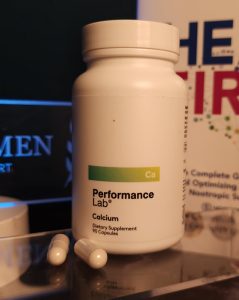 Nefiracetam increases the amount of time calcium channels remain open. Which enhances the glutamate signaling pathway critical for long-term potentiation and forming long-term memories.
Nefiracetam increases the amount of time calcium channels remain open. Which enhances the glutamate signaling pathway critical for long-term potentiation and forming long-term memories.
If you have normal calcium levels in our body, it’s best NOT to supplement with calcium. Because abnormally high levels of calcium can be toxic to cells.
For the elderly who often supplement with calcium to prevent bone loss, abnormally high calcium levels can be a cause of memory loss and dementia.
If you are looking for a great, bioactive Calcium supplement, I recommend: Performance Lab® – Calcium (NutriGenesis®)
Chromium
Chromium is a trace mineral considered essential for human health. Two types of chromium exist; hexavalent chromium (Cr6+) which is highly toxic, and trivalent chromium which occurs in trace amounts in foods, wine and water.
Meat and whole grains, some fruits and vegetables and spices are relatively good sources of chromium. Often providing less than 2 mcg per serving.
As a supplement, trivalent chromium is used in the form of chromium picolinate. Or as GTF chromium which is present within brewer’s yeast cells as glucose tolerance factor (GTF).[viii]
Studies have shown that chromium picolinate increases your body’s sensitivity to insulin. And helps cells extract glucose from your blood. Once in your cells, the glucose is used as energy.
Chromium picolinate has been found to improve learning, recall and memory in older adults at risk for neurodegeneration.[ix]
A Duke University study found that chromium picolinate may help reduce atypical depression symptoms. Atypical depression includes mood swings, carbohydrate cravings, weight gain, rejection sensitivity and lethargy.
15 depressed patients received 600 mcg of chromium picolinate daily or a placebo for 8 weeks. Those using chromium picolinate experienced significantly less mood swings, fatigue and weight gain perception.[x]
Another study found that trivalent chromium combined with D-Phenylalanine activates AMPK.[xi] Adenosine Monophosphate Kinase (AMPK) is a sensor of cellular energy status. Monitoring ATP levels to maintain metabolic homeostasis.
When activated, AMPK activates glycolysis and fatty acid oxidation to boost ATP production.[xii] AMPK regulates almost all aspects of cellular function, including autophagy and maintenance of mitochondrial homeostasis, cell polarity, and cell growth and proliferation.
Chromium increases insulin sensitivity which boosts the production of serotonin in your brain.[xiii] Reducing depression is those with low-grade, persistent depression (dysthymic disorder).[xiv]
Recommended Daily Intake (RDI) according to the US FDA is 35 mcg daily for chromium. Typical GTF Chromium supplementation however is up to 1,000 mcg split into two doses daily.
Copper
* Copper is an essential trace mineral and the 3rd most abundant mineral in your body. It is needed to produce hemoglobin and red blood cells. And for the proper utilization of iron and oxygen within your blood.
Copper is an essential trace mineral and the 3rd most abundant mineral in your body. It is needed to produce hemoglobin and red blood cells. And for the proper utilization of iron and oxygen within your blood.
Copper is required cofactor in various copper-containing enzymes that control neurotransmitters such as dopamine.
It participates in the development of new blood vessels, the creation of myelin, and endorphin recycling.[xv]
Neurons and glial cells in your brain need copper for basic respiration. And the antioxidant enzymes cytochrome c oxidase and superoxide dismutase.
Copper modulates neuron activity and is essential in the normal development of synapses.[xvi]
Copper acts as a catalyst in the reduction of oxygen to water which is the chemical reaction that takes place during ATP synthesis.
Copper is required so your body and brain can use antioxidants like Vitamin C, ascorbate oxidase, superoxide dismutase and tyrosinase. Needed for preventing free radical damage in your brain.
Disruption of copper oxidation in the brain has been linked to disorders like Alzheimer’s, Parkinson’s, Menkes’, Wilson’s disease and ALS.[xvii]
Your body and brain require a constant supply of copper because it cannot store it. Which means you need to consume copper-rich foods such as beef and lamb liver, oysters, nuts, cocoa, black pepper, sunflower seeds, wild-caught fish, beans, some whole grains, avocados, and green olives.
But copper deficiency is more prevalent than you’d expect. Not eating enough copper-rich foods, digestive disorders like Crohn’s disease, and high intakes of iron and zinc supplements all contribute to a copper deficiency.
Signs of copper deficiency include fatigue, trouble concentrating, and poor mood.
Recommended daily dosage for copper is 900 – 1,300 mcg per day.
Iodine
Iodine is an essential trace mineral that combines with the amino acid tyrosine to form thyroid hormones T4 and T3. Thyroxine (T4) contains four iodine atoms, and triiodothyronine (T3) contains three iodine atoms.
Thyroid hormone receptors in your brain help regulate the production of all important neurotransmitters. Not enough iodine result in too little T3 and T4 in your body.
Symptoms of inadequate thyroid hormones (hypothyroidism) include insomnia, fatigue, difficulty concentrating, depression, dry skin and hair, cold sensitivity, frequent and heavy periods for woman, and joint and muscle pain.
Iodine is also required for a healthy immune system. Iodine is antibacterial, antiparasitic, antiviral and has anticancer properties.
Iodine is a powerful method for removing heavy metals and halides like fluoride, chlorine and bromine from your system. These chemicals compete for the same thyroid receptors in cells used by thyroid hormones. Removing these toxins will help thyroid hormones do their job of gene expression and metabolism.
Low T3 levels result in reduced levels of serotonin in your brain. If you don’t respond to SSRI’s for depression it could be due to a thyroid hormone imbalance.[xviii]
Thyroid hormones affect enzymes responsible for synthesis and degradation of GABA, levels of glutamate and GABA, GABA release and reuptake, and GABA(A) receptor expression and function.[xix]
GABA is your brain’s natural Valium. GABA can help turn off stress after you get upset. Or even prevent a stress response in the first place. Low iodine results in low levels of thyroid hormones affecting GABA. Which can lead to depression or anxiety.
Thyroid hormones play a role in dopamine release in the brain. One study showed that an imbalance between thyroid hormones and dopamine could be responsible for restless leg syndrome.[xx]
Thyrotrophic-releasing hormone (TRH) increases acetylcholine (ACh) synthesis. One study showed that those with hypothyroidism had significantly decreased acetylcholine in the hippocampus. And that administration of T4 normalized ACh levels.[xxi]
The bottom-line is not enough iodine in your diet negatively affects neurotransmitters in your brain. And can result in depression, brain fog, anxiety, learning and memory problems, and ultimately lead to neurodegenerative diseases like Alzheimer’s and Parkinson’s.
The most abundant source of Iodine in our diet comes from seafood like kelp, saltwater fish, seal meat, whale meat, oysters, mussels and lobster.
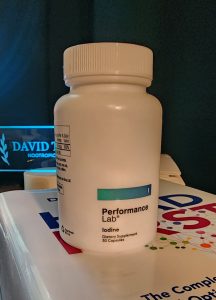 Recommended Iodine dosage is very difficult because everyone needs different amounts based on your body’s ability to use the Iodine. And the level of exposure you have to daily toxins like fluoride, chlorine, and other halides.
Recommended Iodine dosage is very difficult because everyone needs different amounts based on your body’s ability to use the Iodine. And the level of exposure you have to daily toxins like fluoride, chlorine, and other halides.
Natural health practitioners once thought that 25 mg of Iodine per day was good for maintenance. But recent information on the exposure we have daily to toxic load from bromines, fluorides and chlorine bombarding our system may require higher doses.
Natural health doctors are now recommending higher doses which I do not recommend. Dosage very much depends on how much your body needs and in excess can be toxic.
For full dosage instructions including supporting supplements to include to make iodine work better, see the “Dosage Instructions” in the full Iodine review here > Iodine
If you are looking for a great, bioactive Iodine supplement, I recommend: Performance Lab® – Iodine (NutriGenesis®)
Iron
 Iron is an essential mineral for brain function because of its role in oxidative metabolism. And because it is a cofactor in the synthesis of neurotransmitters and myelin.[xxii]
Iron is an essential mineral for brain function because of its role in oxidative metabolism. And because it is a cofactor in the synthesis of neurotransmitters and myelin.[xxii]
Iron is essential for the synthesis of serotonin, norepinephrine and dopamine. It is a cofactor for ribonucleotide reductase which is used to synthesize DNA.
And iron is essential for several electron transfer reactions related to lipid metabolism and brain-energy metabolism.
Iron is also involved in the activity of monoamine oxidase which is critical for regulating dopamine.
Research has shown that drops in iron levels in the brain result in a reduction of dopamine D1 and D2 receptors. Which has a direct negative effect on learning and memory.
Serotonin transporter density decreases along with drops in iron. Along with decreased uptake of norepinephrine. Resulting in poor attention, concentration, and depression.
Studies show that iron-deficient adolescents display symptoms of ADD.[xxiii]
Iron deficiency is the most common nutritional deficiency in the world – including the USA.
This problem is especially relevant in newborns because the result is impaired behavior and learning, lower IQ and developmental delays. And it is irreversible.[xxiv]
Children that are iron deficit because of poor diet score poorly in mathematics and language tests.
A study at UCLA looked to see if variations in iron levels in normal healthy kids made a difference. Turns out it mattered a lot.
The UCLA team measured blood serum transferrin (iron) levels in adolescents. And then performed brain scans when these teens reached their early twenties.
The study found a strong correlation between myelin function and integrity in young adults who followed an iron-poor diet in their teens. Resulting in poor cognition well into adulthood.[xxv]
In adults, symptoms of iron deficiency are anxiety, brain fog, depression, fatigue, irritability, restless legs, poor concentration and insomnia.
If you suspect you are iron deficient, get a full iron panel done including hemoglobin, MCV, ferritin, total iron binding capacity, serum iron and transferrin saturation.
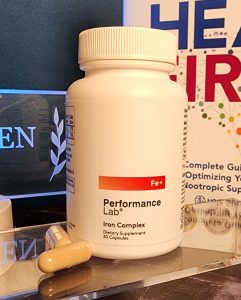 Meat and seafood are the best sources of heme iron (more absorbable). Nonheme iron (less absorbable) is found in leafy greens, beans and nuts.
Meat and seafood are the best sources of heme iron (more absorbable). Nonheme iron (less absorbable) is found in leafy greens, beans and nuts.
It is important you be certain of an iron deficiency before supplementing with iron.
Because excess iron can lead to cirrhosis of the liver, joint and hormone problems. Symptoms of high iron included fatigue, joint pain, low libido and higher risk of diabetes.
Recommended daily allowance (RDA) for iron is:
- Men (19 – 50 years): 8 mg
- Women (19 – 50 years): 18 mg
- Lactating women: 10 mg
- Pregnant women: 27 mg
- Children (4 – 8 years): 10 mg
- Children (9 – 18 years) 8 mg
If you are looking for a great, bioactive Iron supplement that is easy on your stomach, I recommend: Performance Lab® – Iron (NutriGenesis®)
Magnesium
Magnesium is the 4th most abundant mineral in your body. And critical for optimal cognitive health. It is a cofactor in more than 300 enzymatic reactions in your body.
Magnesium assists in converting food into a usable form to produce adenosine triphosphate (ATP). The primary fuel source produced within your mitochondria.
Magnesium is needed for the synthesis of RNA and DNA. It regulates the activity in neuron ion channels. These channels are like tiny electrical switches. Governing the flow of neurotransmitters within neurons.
Magnesium also regulates brain synaptic plasticity. Which is critical for learning and memory.
Magnesium in our diet comes from foods like green leafy vegetables, beans, nuts, seeds, whole grains, poultry, beef, and salmon. Tap, mineral and bottled water also used to be good sources of magnesium. But varies by brand, source and if the magnesium has been filtered out during processing.
Many of us in Western society are living with a magnesium deficiency. And not even aware that we are lacking this important mineral.
Raising brain magnesium levels has been proven to restore neuroplasticity and improve cognitive function.[xxvi]
Most neurohackers report an increased level of focus, energy, memory, and cognitive ability when supplementing with magnesium.
You should also experience an improved quality of sleep. And have an overall improvement in mood.
Recommended magnesium dosage in most common forms is 400 mg per day.
But the problem is most magnesium supplements don’t work well as a nootropic. Because they don’t cross the blood-brain barrier.
However, a new magnesium supplement called Magnesium-L-Threonate (MgT) easily crosses the blood-brain barrier.
This form of magnesium was patented and now produced by Magtein Science. Several supplement companies sell magnesium with this branded form.
If you are looking for a great, bioactive Magnesium supplement, I recommend: Performance Lab® – Magnesium (NutriGenesis®)
Manganese
 Manganese is an essential trace mineral required for bone formation, fat and carbohydrate metabolism, blood sugar regulation and calcium absorption.
Manganese is an essential trace mineral required for bone formation, fat and carbohydrate metabolism, blood sugar regulation and calcium absorption.
Manganese is a required cofactor for several enzymes necessary for neuron and glial cell function in your brain. And enzymes involved in neurotransmitter synthesis and metabolism.
And manganese is needed in the formation of astrocytes. These glial cells help form the endothelial cells for your blood-brain barrier, maintain ion balance, and help repair the brain and spinal cord following traumatic brain injury.
Manganese deficiency is uncommon. But not enough of this essential trace mineral can result in birth defects, impaired fertility, bone malformation, weakness, lower IQ, and enhanced susceptibility to seizures.[xxvii]
On the other hand, too much manganese can result in a condition called manganism which looks and acts like Parkinson’s disease.[xxviii]
You get most of the manganese you need every day from eating seafood, seeds, chocolate, tea, leafy greens, spices, soybeans, pineapple, blueberries and acai. For example, a cup of tea has 0.4 – 1.3 mg of manganese.
The dietary intake of manganese is estimated to be 0.9 – 10 mg per day. With safe and adequate dietary intake to be 2.3 mg per day for men, and 1.8 mg per day for women.[xxix]
Manganese is all around us from alloys and steel used in manufacturing, paints, adhesives, ceramics and even well water. And if you are in mining or a welder you’re in even more danger of manganese toxicity.
My Nootropics Expert recommendation is to NOT use a separate manganese supplement. Several other nootropics can provide an energy boost that some say you can get from using manganese.
Excess manganese will deplete dopamine in your brain.[xxx]
The manganese in most multivitamin/mineral supplements should keep you below toxicity range. But please read the labels to be safe.
Supplements that can counteract manganese toxicity include iron, taurine, Vitamin E, magnesium, NALT, melatonin, quercetin, acai, lemon balm, milk thistle, and lycopene.
Molybdenum
Molybdenum is an essential mineral required as a cofactor in certain critical enzymes in your body and brain.[xxxi]
- sulfite oxidase – required for your body to metabolize sulfur-containing amino acids cysteine and methionine from foods. A rare but fatal disease caused by a lack of this cofactor results in neurological disorders, mental retardation, degradation of the brain and death.[xxxii]
- xanthine oxidoreductase – required for purine metabolism. Purines come from foods and are components of DNA, RNA, ATP, cAMP, NADH and coenzyme A.
- aldehyde oxidase – catalyzes the conversion of aldehydes which are found in everything from alcohol to household toxins to cigarette toxins into a harmless acid and hydrogen peroxide to be expelled by your kidneys.
- mitochondrial amidoxime reductase – acts together with the electron transport proteins NADH-cytochrome b5reductase (CYB5R) and cytochrome b5 (CYB5). Scientists are still trying to figure out what this enzyme does. But so far, it appears to be involved in detoxification and mutations on the DNA level.[xxxiii]
You get molybdenum from foods like legumes, grains, dairy and meat. Phytic acids found in plants block the absorption of molybdenum during digestion.
Average intake for most people seems to be from 76 – 109 mcg per day from food.
The tolerable upper limit seems to be about 2 mg per day.
Recommended daily allowance (RDA) for molybdenum is 75 mcg per day for adults.
Phosphorous
 Phosphorous is the 2nd most abundant mineral in your body. It is present in every cell and essential for life.
Phosphorous is the 2nd most abundant mineral in your body. It is present in every cell and essential for life.
In your body, phosphorous combines with oxygen to form phosphate. Phosphate ions (inorganic phosphate) are involved in hundreds of cellular activities in DNA, RNA, ATP and phospholipids.
The addition and removal phosphate from proteins in all your cells is at the heart of regulating metabolic processes. Phosphorylation and dephosphorylation is how energy is stored and released in living systems. Cell mitochondria use adenosine triphosphate (ATP) for this.
Phosphorous deficiency is not very common because it is in most food and added to many packaged foods.
Phosphorous as phosphate is easily absorbed in your small intestine. Studies show 50 – 90% of dietary phosphate is taken up by your body.
You’ll absorb more phosphorous if you eat a high protein diet. A low-protein diet puts you at greater risk for deficiency.[xxxiv]
Older women are more often at risk of phosphorous deficiency because using high-dose calcium supplements inhibits absorption other minerals including phosphorous.[xxxv]
The cognitive symptoms of phosphorous deficiency include anxiety and trouble concentrating. Because your brain is lacking in the phosphorous needed to make ATP, neurotransmitters and the energy required for brain cell signaling.
Recommended daily allowance (RDA) for phosphorous is 700 mg per day. Children aged 9 – 18 require higher doses of 1,250 mg per day.
You have very little risk of overdosing on phosphorous from diet alone because your kidneys regulate levels in your body.
But taking very high doses of phosphorous daily impairs the synthesis of the Vitamin D which your body and brain requires. And it disrupts calcium absorption.
Potassium
Potassium is an essential mineral for life and the most abundant cation (positively charged ion) in your body.[xxxvi]
98% of the potassium in your body is within your cells. With the remaining 2% in the extracellular (outside) space. Critical for maintaining the voltage difference inside and outside of cells.
The Na+/K+-ATPase enzyme maintains this voltage difference by pumping potassium into a cell while pumping sodium out of the cell.
The “ATP” part of the equation means the enzyme uses energy from ATP to pump sodium out of the cell in exchange for potassium.
This exchange of sodium and potassium is known as the sodium-potassium pump. And is necessary for nerve impulse transmission, muscle contraction and heart function to work properly.
This electrical event within cells is called an “action potential”. Neurons communicate with each other via action potentials.
At the junction between two neurons (synapse), an action potential causes the first neuron to release a neurotransmitter. Which can either excite or inhibit the next neuron from firing its own action potential.
The balance of hundreds of excitatory and inhibitory inputs to a neuron determines whether an action potential will result.
And when you have a deficiency of potassium to participate in these action potentials, bad things happen.
In your brain, potassium deficiency often results in brain fog, fatigue and poor mood.
A 2008 study showed that a high-potassium diet helped to relieve depression.[xxxvii]
Potassium channels act as a facilitator in your brain’s use of serotonin. Not enough potassium can result in feelings of guilt, helplessness, hopelessness, low self-esteem and even suicide. Because your brain is not able to use serotonin to improve mood.[xxxviii]
A diet with more processed food will upset your sodium/potassium balance. Because processed foods are often packed with high levels of sodium.
Food high in potassium include bananas, dried apricots, dates, avocados, cantaloupe, dark leafy vegetables, beans, mushrooms, dairy, fish and nuts.
Most of the potassium you get from food is absorbed through your intestines. Your kidneys do their best to keep your potassium levels in balance.
Recommended daily allowance (RDA) for potassium is 4.7 grams per day.
The average adult gets from 2.2 – 3.3 grams of potassium per day from food.[xxxix]
Symptoms of potassium deficiency include cramps, confusion, depression, fatigue, irritability, and muscle weakness.
If you are looking for a great, bioactive Potassium supplement, I recommend: Performance Lab® – Potassium (NutriGenesis®)
Selenium
Selenium is a trace mineral essential for various aspects of your health. Its main method of action is its incorporation into selenoproteins such as the amino acid selenocysteine.
You have 25 selenoprotein genes in your genome which mostly work as antioxidant enzymes.[xl] Protecting your cells, including brain cells from the inside.
Selenium intake has recently been shown to have anti-aging benefits. A study in France looked at 200 people over the age of 69. The researchers examined the correlation between fatty acids and the number of fish meals per week.
The study found that those with higher fish consumption had higher selenium levels. And the highest levels of DHA and EPA (Omega-3). Which translated into the best cognitive function.[xli]
Selenium is critical for healthy thyroid function. Selenium reduces thyroid peroxidase (TPO) and lowers levels of thyroglobulin antibody (TgAb). Reducing the risk of developing Hashimoto’s or Graves’ disease.[xlii]
Your thyroid affects every cell in your body and brain through the hormones T4 and T3. Within your brain, T4 is converted to T3 by selenium which then affects gene expression controlling metabolism within cells. And activates the catecholamines dopamine, norepinephrine and epinephrine.
Research has found that selenoproteins are involved in motor performance (movement), coordination, memory, cognition, and other brain signaling pathways.
Selenium is important for the development and functioning of GABA. Dopamine pathways are dependent on selenium. And acetylcholine neurotransmission needs selenium.[xliii]
Low selenium levels are associated with anxiety, confusion, depression and hostility.
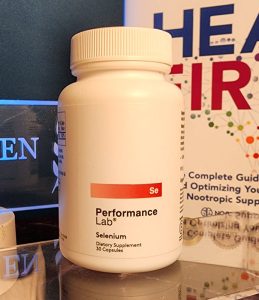 One study conducted at University College in Wales found that 100 mcg of Selenium taken daily for 5 weeks elevated mood and decreased anxiety.[xliv]
One study conducted at University College in Wales found that 100 mcg of Selenium taken daily for 5 weeks elevated mood and decreased anxiety.[xliv]
But like most nootropic supplements, there is no benefit to overdoing it with selenium. In fact, too much selenium has been shown to promote diabetes, and increase the risk of certain types of cancer.
You get some selenium from lamb, fish, poultry, cereal and eggs. Just two Brazil nuts will supply 100 mcg of selenium.
Recommended daily dose if you are going to supplement with selenium is up to 250 mcg per day. Long-term no more than 125 mcg per day.
So check your multivitamin/mineral supplement because it may already be supplying the selenium you need.
If you are looking for a great, bioactive Selenium supplement, I recommend: Performance Lab® – Selenium (NutriGenesis®)
Zinc
Zinc is an essential trace mineral required for optimal brain health and cognition.
Zinc is required for the catalytic activity of around 100 enzymes. Zinc is integral to the synthesis of proteins, the regulation of signaling cascades, gene transcription and neurotransmitter transport. It’s involved in DNA repair and synthesis, and methylation.
Zinc inhibits NMDA receptors which reduces glutamate toxicity. And zinc modulates the activity of proteins such as receptors and enzymes that are involved in the regulation of macromolecules, the regulation of signaling cascades and gene transcription, and transport processes.
Low zinc levels are found in depression. And the lower the level the more severe the depression.
Zinc increases serotonin uptake in select brain regions which increases the efficacy of antidepressants. And it reduces depression because it increases BDNF.
Zinc is required for memory formation. Lack of adequate zinc impairs signaling of BDNF which is required for long-term potentiation to form memories.[xlv]
Zinc inhibits the production of inflammatory cytokines (including nuclear factor-κB). And zinc protects against cognitive decline due to toxic copper levels.[xlvi]
Zinc deficiency is common around the world including in the USA. This deficiency occurs because we don’t eat enough foods that contain zinc.[xlvii]
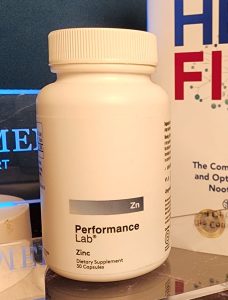 Your body needs about 10 – 20 mg of zinc per day because it can’t store zinc.
Your body needs about 10 – 20 mg of zinc per day because it can’t store zinc.
You get zinc from eating seafood like oysters or lobster. Beef, pork and chicken provide smaller amounts of zinc per serving. And it’s also present in eggs, yogurt, cheese and some nuts.
But not only don’t most of us eat enough zinc-containing food, many plants contain phytates which block the absorption of zinc in your body. So vegetarians are particularly vulnerable to zinc deficiency.
Recommended daily dosage of zinc is 30 mg, balanced with 2 mg of copper.
If you are looking for a great, bioactive Zinc supplement, I recommend: Performance Lab® – Zinc (NutriGenesis®)
Choosing the Best Multi-Mineral Supplement for Brain Health
 The minerals so critical for optimal brain function come from the earth. Literally.
The minerals so critical for optimal brain function come from the earth. Literally.
And herein lies the problem when supplementing with minerals.
Our body and brain cannot use ground up rock.
And yet that’s what you’ll find in most brand name multivitamins found on supermarket and big box retail store shelves.
Ideally, we get all the vitamins and minerals we need from food. And those nutrients come from plants in forms our body can use.
Plants have already converted minerals into an organic form attached to a peptide. Once digested, the minerals bind to amino acid carriers for transport throughout your body and brain.
This binding process is called “chelation”. By binding the two, the amino acid can transport the mineral across your intestinal lining into your bloodstream. And then release the mineral to do its designated job.
You need to same form of minerals in your multivitamin/mineral supplement as found in plants for it to be effective.
For more on selecting the best multi for brain function, see my post, “How to Select the Best Multivitamin for Brain Function”.
And see my review of the multivitamin/mineral supplement called Performance Lab that I use everyday. It contains the same type of minerals normally found in food but don’t get enough of every day from diet alone.
You can get that Multi here: Performance Lab NutriGenesis® Multi for men or women
You may have noticed above that I mentioned several Performance Lab® mineral supplements. Many of which I also use. They use their own proprietary NutriGenesis® technology to grow these minerals so they are in the sane form as you’d get from a plant. And they’re easily absorbed and quickly into your system.
Your brain requires each of the above 13 minerals daily for optimal cognition, memory and mood. Some you will get from a healthy diet; preferably with organic fruit and vegetables, and grass-fed meat.
The remainder must be supplied by supplementing with the right multivitamin/mineral supplement every day.
You’ll feel better and your nootropic stack has a more likely chance of providing the benefits you were looking for.








Join The Discussion - 50 comments
Robert
August 30, 2021
Dear David, I can’t find the version of Green Bali that you consume in Organa Kratom, could you please give me a link?
(I try to use it to have more energy)
– What nootropics do you recommend for panic attacks?
– Consuming only 500 mg of berberine per day could cause muscle loss?
– Is it effective to take expired L Tryptofan ?, (I bought a 500 gram bag of Bulksuplements and it will expire long before I can finish it)
– Could you please recommend the best nootropics to fight hemorrhoids?
God bless you
David Tomen
August 31, 2021
Robert, doesn’t look like they have Green Bali in stock so this is the next best option and user reviews while sparse are favorable: https://www.organakratom.com/kratom-capsules/green-borneo-kratom-capsules/
Berberine and muscle wasting is inconclusive because it was only shown in mice. And the authors of the study mentioned a couple of other human studies with diabetic patients using Berberine who did NOT experience muscle wasting (https://www.ncbi.nlm.nih.gov/labs/pmc/articles/PMC2911075/). I just use Milk Thistle to be on the safe side. It may be completely unnecessary but I know at least that Milk Thistle extract is good for me.
For what you paid for bulk Tryptophan I think I would stay on the side of caution and just get a fresh bag. The worst that could happen with the expired bag is it would not work.
And sorry, but I haven’t a clue on what to do for hemorrhoids. Not unless they are found in the brain. But I surmise you’re talking about the other end? 🙂
Robert
August 31, 2021
Thank you David for your answers and love in every word, you just forgot the question about
– What nootropics do you recommend for panic attacks?
– And do you think this is a good brand of Bacopa Monnieri (it has no other ingredients but I want your opinion)
Bulk Supplements – Bacopa Extract
– Finally, I must take 175 mg of Milk Thistle every time I take Berberine or 175 mg a day is enough
David Tomen
September 1, 2021
Robert, use the search function top right above the top menu and search for “panic”. You’ll get a list of a few nootropics that have either been proven in clinical studies to reduce panic attacks. Or user reports saying it get rid of their panic attacks.
Bulk Supplements is a good brand and they test everything they sell. Including providing a Certificate of Analysis is you ask them. They claim their extract contains 50% Bacosides which is good. Let us know how it works for you.
I take Milk Thistle each time I use Berberine during the day which is 2 – 3-times per day. Not sure if taking Milk Thistle once per day would be enough which is why I use it multiple times during the day.
Wong
June 29, 2021
Hi David
My wife is on performance lab multi however her iron level is only 8.9umol/L. Would like to know
what is the most bio available iron supplements that you can recommend for her? Is heme iron good?
David Tomen
June 29, 2021
Wong, she needs Ferrous Bisglycinate which is a chelated from of ferrous iron and has good clinical studies supporting its use. It takes awhile to build up iron in your system. This is the one we use in our household: https://amzn.to/3AfASfc
Bilma
December 7, 2020
Hello David, Do you think this brand is reliable?, is the only one that brings Sulbutiamine and Aniracetam to my country
“The Northern Labs”.
I would also like to know, according to some studies the consumption of vitamin E above 300 mg increases the risk of Stroke, donyou think that consuming 500 mg every day is safe? how much do you consume per day?
Finally, do you think that Boron and potassium supplementation is necessary? on a diet rich in potatoes and meat?
David Tomen
December 7, 2020
Bilma, I don’t know this company. I suggest finding out more about them and if they have a comprehensive testing program in place. And if they’re willing or even able to provide a Certificate of Analysis for each supplement you intend to buy.
The recommended daily dose of Vitamin E is less than 400 IU per day. High levels of Vitamin E increase your risk for heart failure (in diabetics), worse bleeding disorders, increased chance of head, neck and prostate cancer, increased bleeding after surgery, and increased chance of death after a heart attack or stroke.
And supplementing with Boron and Potassium is likely a good idea. Because our food supply is deficient in most of these critical nutrients. For a whole host of reasons.
If you have some way to test your boron and potassium levels and to test the levels in the food you eat then you’d know for certain your status. If you can’t run these tests then using reasonable dosages for each of these nutrients daily is just good insurance.
Bilma
December 9, 2020
thanks for answering David, I appreciate it. The question about magnesium supplementation is because they all have maximum doses of 99 mg, when the daily dose is around 4000 mg, would you recommend any brand that I can find in Amazon that provides much more than 99 mg of magnesium, please?
I would also like to know, please. Why didn’t you put vitamin B8 (inositol) on your list of the 13 Essential Vitamins for the Optimized Brain? Is it not as important as the others?
Bilma
December 9, 2020
Sorry my previous question has an error, I wanted to say the supplementation with Potassium, here I write again what I wanted to say: thanks for answering David, I appreciate it. The question about Potassium supplementation is because they all have maximum doses of 99 mg, when the daily dose is around 4000 mg, which makes it extremely expensive to reach the daily dose with 99 mg, would you recommend any brand and Link that I can find in Amazon that provides much more than 99 mg of magnesium, please?
David Tomen
December 10, 2020
Bilma, the recommended daily allowance (RDA) for potassium is 4.7 grams per day. And the average adult gets from 2.2 – 3.3 grams of potassium per day from food.
So I think what you are asking is for a potassium supplement that can easily provide around 2,000 mg or 2 grams per day. For potassium deficiency medical professional recommend Potassium Gluconate. And you are correct where a 580 mg supplement still only provides 99 mg elemental potassium.
The problem is you should not take more than 100 – 200 mg potassium at at time because higher amounts can cause side effects. And is contraindicated with drugs like ibuprofen. This is about as good as you can do to make up for a potassium deficiency. But used long-term and every day should help.
This is the only one that I know of that contains zero additives. It comes as a powder from NOW Foods: https://amzn.to/2Kh4pPN
David Tomen
December 10, 2020
Bilma, the recommended dosage for magnesium is 400 mg per day for most people. And it needs to be chelated for it to cross the blood-brain barrier if you want the brain benefits.
The standalone magnesium supplement that I use and recommend comes in 100 mg tablets. And I take for tablets before bed. It’s here: https://amzn.to/3oGoC0x
Inositol is not a B-Vitamin nor any kind of vitamin for that matter. That’s why I didn’t include it in my “13 Vitamins” article. It is important because it acts as a ‘secondary messenger’ that all of your major neurotransmitters need to relay messages. But it’s not a vitamin.
Laura
July 5, 2020
Hi David, Is there a specific form of potassium that works best to supplement?
Thank you
David Tomen
July 6, 2020
Laura, it’s always best to choose a ‘chelated’ form of minerals because that’s what our bodies recognize as food. Something like this one: https://amzn.to/2D8fLSG
Jay LIM
March 12, 2019
Dear David. Thank you for the good article!
Which product do you recommend more? Product containing only Yeast-Free Selenium L-selenomethionine (Most Major Company Products) or Life Extension Super Selenium Complex?
Life Extension contain – “Vitamin E (as D-alpha tocopheryl succinate) 20.1 mg, Selenium (L-selenomethionine) 50 mcg, Selenium (sodium selenite) 50 mcg, Selenium (Se-Methyl-L-Selenocysteine) 100 mcg”
Life Extension’s description say that “Each form of selenium acts along a different pathway to support healthy cell division. For optimized selenium support, one should supplement with all three forms of selenium.” It seems convincing to me, but most companies only contain Yeast-Free Selenium L-selenomethionin. I’d like to hear your opinion.
Thank you in advance for your answer!
David Tomen
March 13, 2019
Jay, Life Extension’s argument for all three forms of Selenium likely makes sense. Those guys do their homework and know what they’re talking about. I’d need to research in more for a more definitive answer.
I’ve been getting my Selenium lately from the Performance Lab Whole-Food Multi for men which is grown in Saccharomyces cerevisiae (brewer’s yeast). And it works for me. It’s probably closer to what Life Extension promotes than regular L-selenomethionine.
tal cohen
September 23, 2018
Hi David ,
Great article. I would like to know your opinion about Colloidal or Mono-atomic minerals supplements.
Is this supplements consider nootropics ?
David Tomen
September 24, 2018
Tal, as far as I can tell, neither could be used as nootropics because they don’t provide the nutritional support your body’s cells would recognize as food. These forms of minerals do not naturally occur in plants or the animals that consume plants.
Issie
July 11, 2018
Hi David Tomen. That’s a great article for health. For women, I think Iron is very essential mineral for brain function especially during pregnancy. I would like your suggestions about the iron supplements.
David Tomen
July 11, 2018
Issie, choosing an iron supplement that will not constipate you is important. I’ve found that a chelated ferrous bisglycinate version from Albion Minerals is a good choice. One that my wife likes that uses this version of iron is by Blue Bonnet > https://amzn.to/2NH2Xnf
Elena Diaz
April 13, 2018
David,
What a great read. I started taking an organic selenium yeast 2 years ago after reading about the KiSel-10 study, in which seniors were taking selenium and CoQ10 daily for 4 years boosting cardiac function and reducing mortality. My family has a history of bad cardiovascular health. So, I have felt reassured and it has increased my overall well-being. What is your take on this study?
Elena
David Tomen
April 13, 2018
Elena, this may be the followup to the study you mention > http://journals.plos.org/plosone/article?id=10.1371/journal.pone.0193120. Turns out that selenium is a cofactor in the conversion of ubiquinone to Ubiquinol within cells. And the combined action of selenium and CoQ10 protects the cell from oxidative damage > https://www.ncbi.nlm.nih.gov/pubmed/12435734.
One thing to note was the researchers pointed out this was a European study where blood selenium levels are lower than in America. Primarily due to lower selenium content in soil.
CoQ10 levels drop as we age > https://nootropicsexpert.com/coenzyme-q10/. That combined with low selenium levels is bad news.
There are so many takeaways from the first study I pointed to that we could talk about this for days. But I think it’s safe to say it does our body good to make sure we have adequate levels of selenium and CoQ10 every day.